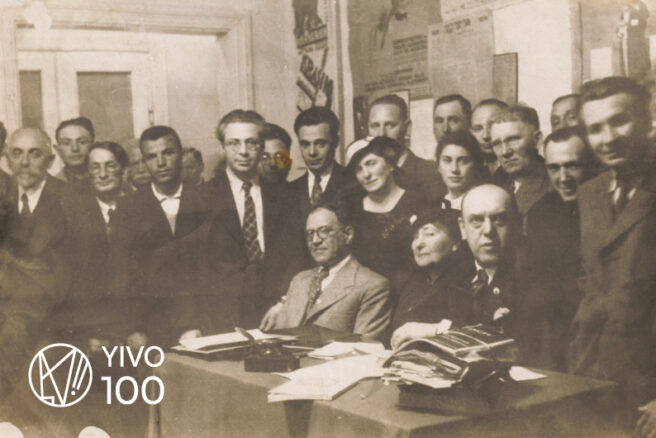This year marks the centenary of the Jewish Scientific Institute (YIVO), founded in Vilnius in 1925. This cultural and academic institution was the most important centre for research of the Yiddish language and the history of Eastern European Jews. Its activities are significant for Jewish communities worldwide. The 100th anniversary of the Institute is included in the resolution of the Seimas of the Republic of Lithuania “On the Anniversaries of Events and Personalities Important to Lithuania Commemorated in 2025”.

In its Vilnius period, YIVO maintained contacts with non-Jewish academies of science and research institutes, universities, libraries, and cultural societies (e.g., the Lithuanian Cultural Society). Members of YIVO’s honourary presidium included Albert Einstein, Sigmund Freud and other famous scientists and public figures of that time. The activities of the institute were supported by Marc Chagall and Mykolas Biržiška.
YIVO is the only Vilnius Jewish institution that did not cease its activities during the Holocaust and continues them to this day in New York. A branch of the institute established in 1925 in New York became the main headquarters of YIVO after World War II. It took over the institute’s functions as a custodian of Jewish heritage and a research centre.
A number of traces of the Institute’s activities have remained in Vilnius: fragments of its documentation, correspondence, library and archives, scattered through several memory institutions (Central State Archives of Lithuania, Wroblewski Library of the Lithuanian Academy of Sciences, The Martynas Mažvydas National Library of Lithuania). The National Library of Lithuania preserves fragments of the YIVO archive that are of extremely significant scope and content. Library is conducting research into the institute’s archives, revealing YIVO’s Vilnius origins and the extremely fruitful pre-war period of its activities in Vilnius.
The National Library, in cooperation with a large number of Lithuanian and foreign partners, among whom are YIVO institute for Jewish Research in New York, YIVO Argentina and others, is implementing a rich program dedicated to the YIVO’s centenary. It includes publishing books on YIVO history. One of them is a Lithuanian translation of the monograph “YIVO and the Making of Modern Jewish Culture: Scholarship for the Yiddish Nation” by Dr. Cecile Kuznitz, an important US researcher of Jewish cultural history. Another one is an anthology of correspondence of YIVO in Vilnius (1925–1941) in Lithuanian and English translations entitled “Dear Scientific Institute!”
A part of the celebratory program is an international academic forum with participation of researchers from Israel, Great Britain, Argentina, Poland, the United States of America and Lithuania who will give public talks on YIVO history and achievements.
A documentary exhibition „YIVO 100. Origins, Journey, Legacy“ will be held at the National Library in fall. Currently, the National Library’s exhibition “Friends of YIVO. The Vilnius YIVO Institute and the Interwar Jewish World” is presented at the Ministry of Foreign Affairs of the Republic of Lithuania.
The National Library is co-organising with Vilnius University an international scholarly conference “YIVO in Vilnius and in the World”.
At the initiative of the National Library, Lithuanian Post issued a commemorative postage stamp, envelope, and seal to mark the centenary of YIVO. They were created by an artist and an expert in Jewish studies, Miglė Anušauskaitė.
Exhibits from the National Library’s Judaica collection will complement YIVO-theme exhibitions by other institutions, such as the Lithuanian National Museum of Art and Vilna Gaon Museum of Jewish History. Experts of the National Library consult and cooperate in various memory institutions’ programs dedicated to this important anniversary, participate in academic and educational events in Lithuania and abroad. Throughout the year, the Judaica Research Center of the National Library is creating podcasts and social media content to commemorate YIVO centennial.
The National Library program is partially funded by the Lithuanian Council for Culture and the Ministry of Culture of the Republic of Lithuania.
Find out more here.